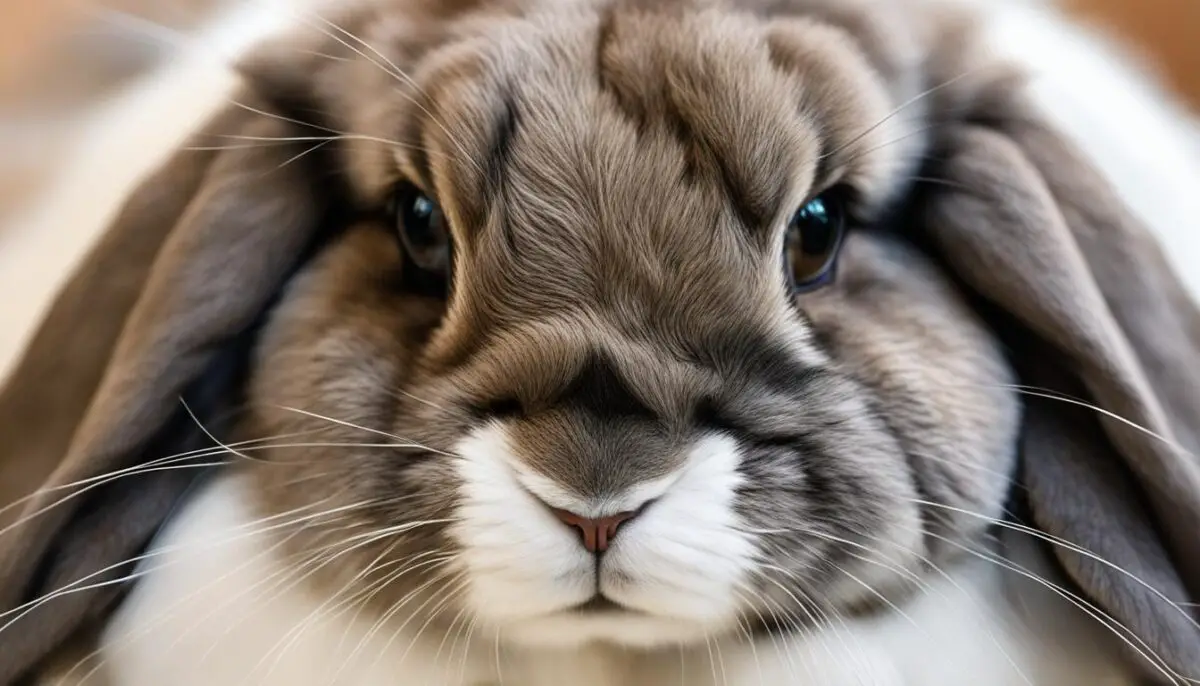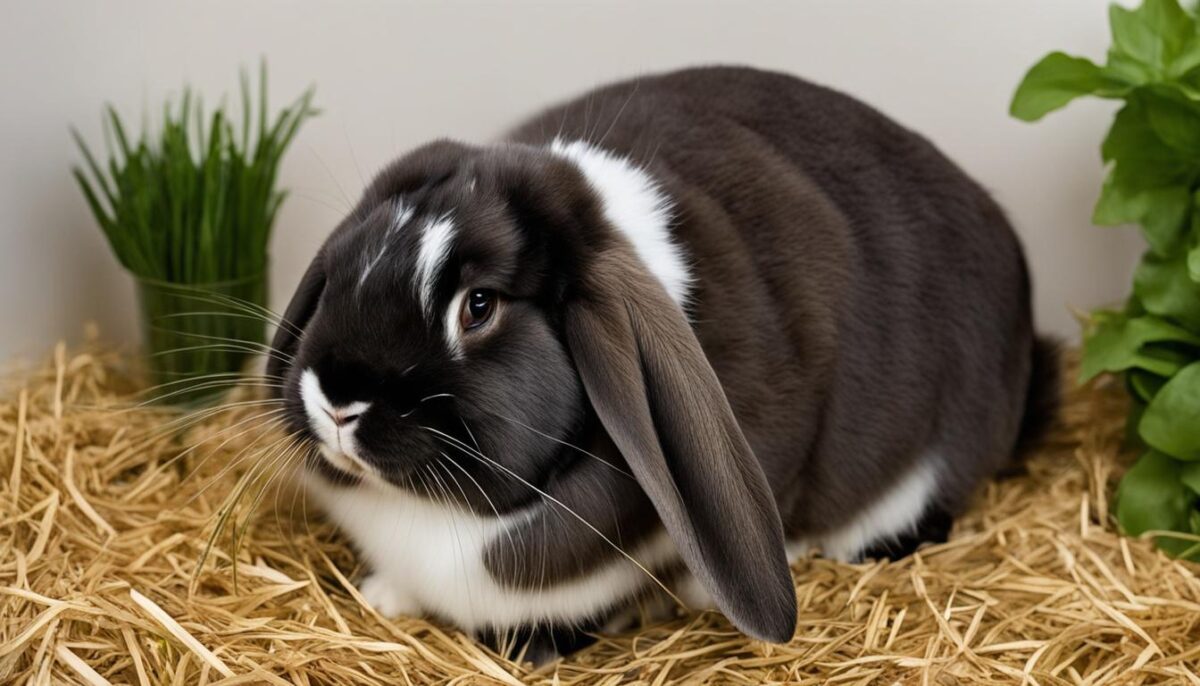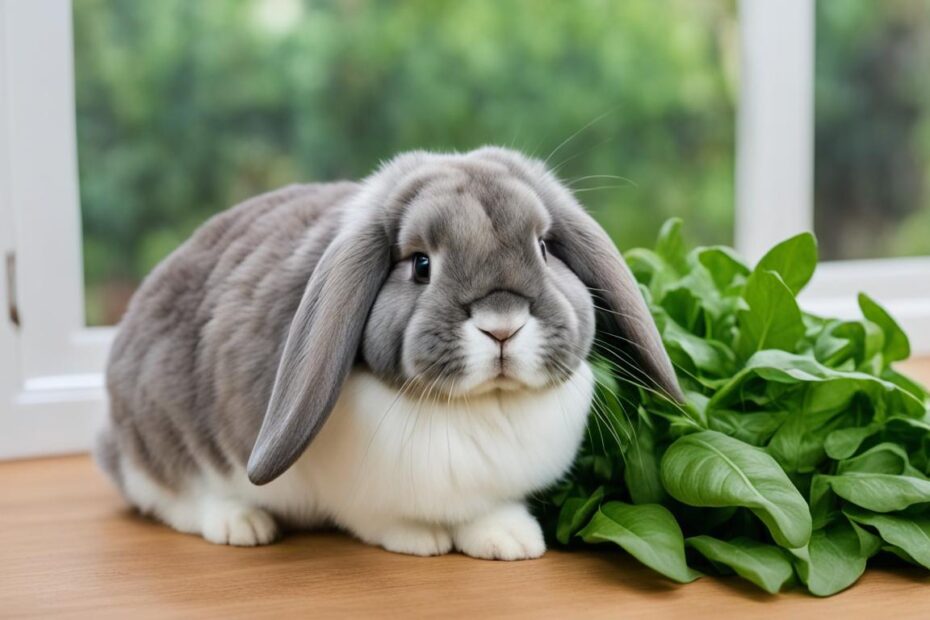Welcome to our Holland Lop Rabbit Care Guide! If you are considering a holland lop as a pet rabbit, you’ve made an excellent choice. These small rabbits are not only incredibly adorable but also known for their friendly and gentle nature. Originating from the Netherlands, Holland Lops are the smallest of the lop-eared rabbit breeds. Let’s explore everything you need to know to provide the best care for your furry friend.
Key Takeaways:
- Holland Lops are a popular pet rabbit breed known for their adorable appearance and friendly nature.
- They are small in size, weighing about 2-4 pounds, making them suitable for those with limited space.
- Holland Lops have a lifespan of 5-7 years and require regular grooming and exercise.
- These social animals make great pets for families with young children.
- Stay tuned for the following sections, where we will discuss choosing a Holland Lop, their habitat and diet, health care, and more!
Choosing a Holland Lop and Basic Health Checks
When it comes to choosing a Holland Lop, there are a few key factors to consider. Look for a healthy bunny with an outgoing personality, as these traits are indicative of a well-adjusted rabbit. Here’s a checklist of basic health checks to ensure you bring home a happy and thriving Holland Lop:
- Alert and attentive eyes
- Dry nose
- Clean and scentless ears
- Clean paws
- Clean and dry underside
- Soft and silky fur
- Proper teeth alignment
Holland Lops are generally easy to care for, but they do require some grooming. Regular brushing, grooming, and nail clipping are essential to keep their coat and nails in good condition. Additionally, they need a well-balanced diet that includes foods with adequate protein and fiber. Timothy, Orchard Grass, or a Botanical Hay should be provided at all times to support their digestive health.
Veterinary Check-ups and Spaying/Neutering
To ensure the overall health of your Holland Lop, regular veterinary check-ups are necessary. A qualified veterinarian experienced in rabbit care will be able to provide the best guidance and care for your furry friend. It’s important to schedule routine check-ups and vaccinations to prevent any potential health issues.
Spaying or neutering is strongly recommended for Holland Lops unless you plan on breeding rabbits. This helps prevent health risks such as uterine cancer in females and aggressive behavior in males. Consult your veterinarian to determine the most appropriate time for spaying or neutering your Holland Lop.
| Key Health Checks | Frequency |
|---|---|
| Dental examination | Every 6-12 months |
| Internal parasite testing | Yearly |
| Vaccinations | As advised by your veterinarian |
| Body condition evaluation | Monthly |

Habitat and Diet for Holland Lops
Creating a suitable habitat for your Holland Lop rabbit is crucial for their overall well-being. Here are some essential tips to ensure your furry friend is happy and healthy:
Holland Lop Rabbit Habitat
- Provide a cage that is at least 24×36 inches or larger to give your Holland Lop enough space to move around comfortably.
- Opt for a cage with a solid floor to prevent sores on their sensitive feet.
- Use bedding made of edible materials such as meadow or timothy hay, a natural fiber blanket, or pelleted paper. This not only provides comfort but also allows for natural foraging behaviors.
- Decide whether to keep your Holland Lop indoors or outdoors. While they can thrive in both environments, indoor living tends to result in longer and happier lives.
- Consider placing a litter box inside the cage filled with fresh hay for easy cleanup and to encourage litter training.
Holland Lop Rabbit Diet
A well-balanced diet is essential for the health of your Holland Lop rabbit. Follow these dietary guidelines:
- Provide your Holland Lop with unlimited access to high-quality grass hay, such as timothy or orchard grass. This hay should constitute the majority of their diet and helps maintain proper dental health as it wears down their teeth.
- Supplement their diet with a small amount of high-fiber rabbit pellets. These pellets should be specifically formulated for rabbits and not mixed with other ingredients or treats.
- Introduce appropriate leafy vegetables to their diet, such as romaine lettuce, kale, spinach, or cilantro. Be sure to wash the vegetables thoroughly before feeding.
- Avoid feeding your Holland Lop foods that can harm their delicate digestive system, such as corn, grains, sugary treats, or human food.
- Ensure a constant supply of fresh, clean water. You can use a sipper bottle or a ceramic dish to provide water for your rabbit.
Recommended Feeding Schedule for Holland Lops:
| Age | Amount of Hay (in cups) | Amount of Pellets (in tablespoons) | Leafy Vegetables (in cups) |
|---|---|---|---|
| Under 6 months | Unlimited | 1/8 – 1/4 | 1/4 – 1/2 |
| 6 months and older | Unlimited | 1/8 | 1/2 – 1 |
Remember, maintaining a suitable habitat and providing a well-balanced diet are key responsibilities as a Holland Lop rabbit owner. By meeting their basic needs, you can ensure they live a happy and healthy life.

Health Care for Holland Lops
Regular health care is essential for Holland Lops. It is important to observe them closely for any signs of illness, such as changes in eating or drinking habits, diarrhea, eye or nasal discharge, or unusual behavior. Monthly inspections that include checking their coat, teeth, and paws are recommended to catch any potential issues early on. Yearly check-ups with a veterinarian are necessary to ensure their overall well-being and address any underlying health concerns.
Spaying or neutering your Holland Lop is strongly recommended as it helps prevent health risks and unwanted behaviors. This procedure is best performed by a veterinarian experienced in rabbit care. Additionally, providing enough exercise and mental stimulation is crucial for their physical and mental health. Engaging them in playtime activities and providing interactive toys can help keep them active and entertained.
Holland Lops should be kept in a safe and clean environment to ensure their well-being. Proper hygiene practices, such as regular cage cleaning, are essential. A clean living space minimizes the risk of infections or parasites. Providing a comfortable and spacious cage or enclosure with appropriate bedding material is also important for their overall comfort.
Common Health Issues in Holland Lops
| Health Issue | Symptoms | Treatment |
|---|---|---|
| Gastrointestinal Stasis | Decreased or no appetite, bloating, constipation | Fluid therapy, medication, increased exercise and dietary fiber |
| Dental Problems | Difficulty eating, drooling, weight loss | Tooth trimming or extraction, dietary adjustments |
| Mites or Fleas | Itching, hair loss, redness | Topical or oral medications, cleaning of living area |
| Respiratory Issues | Sneezing, coughing, nasal discharge | Antibiotics, supportive care, improved ventilation |
| Urinary Tract Infections | Increase in urination, blood in urine | Antibiotics, increased water intake, dietary adjustments |
By prioritizing the health care needs of your Holland Lop, you can ensure they lead a happy and healthy life. Regular check-ups, addressing any health issues promptly, and providing a clean and stimulating environment are essential for their overall well-being.
Conclusion
Holland Lop rabbits are an excellent choice for those looking for a small, friendly, and low-maintenance pet. By following the tips and information provided in this holland lop rabbit care guide, you can ensure that your furry friend lives a happy and healthy life.
Start by choosing a healthy bunny with a lively personality. Create a suitable habitat for your Holland Lop, whether indoors or outdoors, with a spacious cage and proper bedding. Ensure they have a well-balanced diet consisting of high-quality hay, pellets, and leafy vegetables.
Regular veterinary care is essential for maintaining your Holland Lop’s well-being. Schedule annual check-ups and keep an eye out for any signs of illness or behavior changes. Provide plenty of exercise and mental stimulation to keep your rabbit physically and mentally healthy.
With proper care and attention, your Holland Lop will become a cherished companion for years to come. So, follow the best tips and information in this holland lop rabbit care guide to ensure the well-being of your beloved pet!
FAQ
Where do Holland Lop rabbits come from?
Holland Lop rabbits originated from the Netherlands.
How big do Holland Lop rabbits get?
Holland Lop rabbits weigh about 2-4 pounds, making them the smallest of the lop-eared rabbit breeds.
Are Holland Lop rabbits good pets for families with young children?
Yes, Holland Lop rabbits are known for their friendly nature and make great pets for families with young children.
What is the lifespan of a Holland Lop rabbit?
Holland Lop rabbits have a lifespan of 5-7 years.
How should I choose a Holland Lop rabbit?
When choosing a Holland Lop rabbit, look for a healthy bunny with an outgoing personality. Check for alert and attentive eyes, a dry nose, clean and scentless ears, clean paws, a clean and dry underside, soft and silky fur, and proper teeth alignment.
What kind of diet should I provide for a Holland Lop rabbit?
Holland Lop rabbits require a well-balanced diet consisting of high-quality grass hay, rabbit pellets, and appropriate leafy vegetables. Timothy, Orchard Grass, or a Botanical Hay should be provided at all times, while foods that can harm their digestive system, such as corn or grains, should be avoided.
How should I care for the habitat of a Holland Lop rabbit?
Holland Lop rabbits require a cage that is at least 24×36 inches or larger. A solid floor is advisable to prevent sores on their feet. Bedding made of edible materials like meadow or timothy hay, natural fiber blanket, or pelleted paper should be provided. A litter box with fresh hay can be placed inside the cage for easy cleanup.
Do Holland Lop rabbits need regular veterinary care?
Yes, regular veterinary check-ups are necessary to ensure the overall health of Holland Lop rabbits. It’s important to choose a veterinarian experienced in rabbit care.
How often should I groom a Holland Lop rabbit?
Holland Lop rabbits require regular brushing, grooming, and nail clipping.
What signs should I look for to monitor the health of a Holland Lop rabbit?
Holland Lop rabbits should be observed for signs of illness, such as changes in eating or drinking habits, diarrhea, eye or nasal discharge, and unusual behavior. Monthly inspections including coat, teeth, and paws are recommended.
Are Holland Lop rabbits suitable for indoor or outdoor living?
While Holland Lop rabbits can be kept both indoors and outdoors, indoor living usually results in longer and happier lives.


